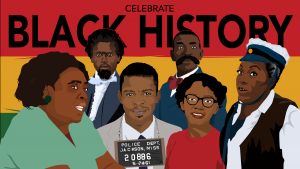Black History Month, observed for the entire month of February in the US, is a time to honor and celebrate Black history and those individuals who strove to ensure that the United States lives true to the ideal of equality for all. The month provides all Americans with opportunities to honor and learn about African American struggles and achievements and to reflect on the topics of freedom and equal opportunity. At IMS, we are pleased to take part in observance of Black History Month.
A core value at IMS is to, every day, “Operate as one.” A component of this tenet inspires each member of the company to, “Celebrate our diversity, be equitable in your actions, and be inclusive by nature.” Throughout the year, team members provide, and are provided with, opportunities for increased knowledge and growth concerning the topics of diversity, equality, and inclusion. The IMS Diversity, Equity, and Inclusion (DEI) Committee is instrumental in furthering IMS’s visions and core value to “Operate as one.”
In honor of 2021 Black History Month, the DEI Committee hosted a virtual book club in which members read and discussed the book, “So You Want to Talk About Race,” by Ijeoma Oluo. Some of the topics of discussion included privilege, class, and the impact of microaggressions. The discussions were moderated by Safia Pulliam, a holistic health and wellness guide, and she helped ensure members felt safe to engage in honest conversations and to openly share personal experiences.

Andrew Buckley, Trial Consultant in our Dallas office, says, “These discussions are imperative not only because they create a culture of diversity in the workplace but because they inspire empathy for the individual experiences of those around us, especially when those experiences are different than our own. These conversations are sometimes uncomfortable and painful, but they lead to a workplace where people can come together as their whole selves.”
In addition to the book club, IMS put the spotlight on several African American champions of the cause for civil rights by telling their stories. IMS Senior Graphics Designer, Jerry Williams! created the powerful illustrations of these important African American figures. When asked about his artistic process, Jerry said, as he looked through pictures of each person, he discovered that if he recreated the images but directed the eyes forward, their impact on a viewer would be greater.
Jerry said, “My goal is for every person who views the photos to feel a connection with these courageous and inspirational individuals.”
Learn more about the people illustrated below.

From left to right: Fannie Lou Hamer, Robert Smalls, John Lewis, Bass Reeves, Claudette Colvin, Florynce “Flo” Kennedy[/caption]
Fannie Lou Hamer (1917–1977) Born in Mississippi, the 20th child of sharecropper parents, Fannie Lou Hamer overcame great obstacles in order to vote. In 1962, although she had the constitutional right to vote, she was denied the right to register due to a sham illiteracy test. She eventually registered but was then denied voting privileges based on nonpayment of poll taxes. Despite threats and beatings, she dedicated her life to helping African Americans vote. Hamer helped found the Mississippi Freedom Democratic Party and the National Women’s Political Caucus, and she helped thousands of African Americans in Mississippi become registered voters.
Robert Smalls (1839–1915) Robert Smalls, born a slave in South Carolina, pulled off a daring feat during the US Civil War that won his family’s freedom and advanced the Union Army’s efforts. When the captain and crew of the Confederate ship, CSS Planter, disembarked for the night, Smalls commandeered the ship into Union waters, picking up his enslaved family and friends along the way. When he displayed the white flag of surrender, the vessel became a Union warship, Smalls’ family and friends were freed, and President Lincoln became convinced that African American soldiers should be allowed to fight in the Union Army. Smalls went on to become captain of the CSS Planter, served in both houses of the South Carolina legislature, and served five terms in the US House of Representatives.
John Lewis (1940–2020) John Lewis was the son of Alabama sharecroppers who went on to become a champion for the cause of civil rights. In 1961, he was a member of the Freedom Riders, civil rights activists who took bus trips through the South to protest segregated bus terminals. During these efforts, Lewis was often beaten and arrested. In 1963, he was one of the “Big Six” leaders who helped plan the March on Washington in support of civil rights legislation that was pending in the US Congress. Although the Civil Rights Act was passed in 1964, African Americans in the South were often precluded from voting. In response, Lewis planned and participated in the Selma to Montgomery March, an event in which he was severely beaten by an Alabama state trooper. Ultimately, this march helped speed up passage of the 1965 Voting Rights Act. Throughout his life, Lewis was dedicated to helping register minorities to vote, served 17 terms in the US House of Representatives, and was the recipient of the Presidential Medal of Freedom.
Bass Reeves (1838–1910) Bass Reeves was born into slavery in Crawford County, Arkansas. When his enslaver joined the Confederate Army during the US Civil War, he brought Reeves to fight along with him. Reeves eventually fled to Indian Territory, in the area that is today Oklahoma, where he took refuge with native tribes. After President Lincoln issued the Emancipation Proclamation in 1863, Reeves was no longer considered a fugitive and was a free man. He returned to Arkansas and lived a quiet life as a farmer until, in 1875, US District Judge Isaac C. Parker, impressed by Reeves’ knowledge of western terrain and several Native American languages, commissioned him as Deputy US Marshal for the Indian Territory and Arkansas. Reeves was the first Black Deputy US Marshal west of the Mississippi River and one of the most accomplished peace officers in the history of the western frontier.
Claudette Colvin Nine months before the widely publicized 1955 Montgomery, Alabama, incident in which Rosa Parks refused to give up her seat on the bus to a white person, fifteen-year-old Claudette Colvin had the same experience and exhibited the same reaction. Colvin’s refusal to abide by segregation on the bus was not well publicized, largely because, after the bus incident, she became pregnant while unmarried, a state which carried a stigma at the time. She showed incredible resolve when she refused to give up her seat, resisted arrest when police put her in handcuffs, and went on to challenge bus segregation laws in court. She was one of four women plaintiffs in Browder v. Gayle, and this court case successfully overturned bus segregation laws in Alabama.
Florynce “Flo” Kennedy (1916–2000) Flo Kennedy was a lawyer, actress, feminist, and civil rights activist. Born in Kansas City, Missouri, Kennedy later moved to New York where she was rejected from Columbia Law School on the basis of race. When she threatened to sue, she was admitted and became the only African American woman in a class that had only eight women total. She graduated in 1951 and carried on with activism on behalf of women and Black people, a pursuit she had engaged in since high school. Kennedy was a flamboyant dresser and an effective civil rights advocate who produced plays on feminist issues, helped found the National Women’s Political Caucus, and organized lobbying against the media for its disparaging portrayal (or lack of any portrayal whatsoever) of Black people, to name a few of her many accomplishments.
